AWFT22: Resilience and War – Tourism in Kharkiv, Ukraine
November 10, 2022 – On October 27 and 28, TCN had the honour of attending the A World for Travel Forum in Nimes, France. With the theme of the forum being sustainability in travel and tourism, there was a lot of talk aimed at climate change, the issues of cross-sector collaboration, involvement of local communities and industries; small businesses were sharing their visions of sustainable travel, companies like Mastercard and Google had their say, you name it – the forum covered it. There was one panel that stood out, though. One topic that made us feel it is just as important now and long-term. One that reminded us of home. A Case Study: Resilience and War, the agenda said, or how Kharkiv in Ukraine is preparing to protect their cultural heritage and monuments in times of crisis.
Sorry, what? Who thinks about tourism in times like that? It turns out it’s those who need to. Sustainability seems to be a lot more than offsetting your carbon footprint, eating locally, or even government policies supporting the development of such tourism. It is a common goal; it is about the ordinary person; it is the realisation that we must support each other. In every sense of the phrase, we must stand together, now and again, to ensure a better future for all. Even if cities fall and disappear, people remain; our culture lives on and becomes our legacy.
On a panel moderated by Peter Greenberg, the CBS News Travel Editor, his guests Yuliia Zghurska (Deputy Director, Kharkiv City Council), and Hon. Yuliya Sosyukina (Goodwill Ambassador, IHRCHQ/Mrs. Universe Monaco 2021) spoke about what the city of Kharkiv is currently facing and what measures have been taken to preserve its culture as much as possible. The most important message: keep sharing, keep spreading the word, help any way you can. Though both lovely Ukrainian ladies were fully booked for interviews on both days, we had a chance to sit down with them and share experiences, stories, frustrations, and feelings of love, respect, and support.
Our conversation started with the reasons why they came to the forum. It is important, they said, because they need to be able to plan their future. The war will be over, and they need to speak about Ukraine, about Kharkiv – now. Kharkiv is the second biggest city in Ukraine and one of its most visited places, with a million tourists annually. Even in these times, they say, tourism in Kharkiv is alive, just with a different definition. Now tourists are the diplomats, journalists, and people who care and want to see what is happening and how they can help. The city’s officials have now become its tourist promotors in an entirely new way. Their primary mission is to save and preserve their country. What a job, huh?
When we mentioned the Homeland war in Croatia, they pointed out that it is now important for other countries who have been through similar events to share their experience, teach Ukraine how to cope, look into the future, and above all, show their support. They do think that Croatia’s Vukovar has set a good example. Memorial tourism, they say, is something we need to accept but must not allow to become the whole identity of a place. And even though it might seem like that in Vukovar, especially in November, the energy of the city and its young minds, we are sure, will drive tourism forward. Just ask any of our friends from the Vukovar 365 series.
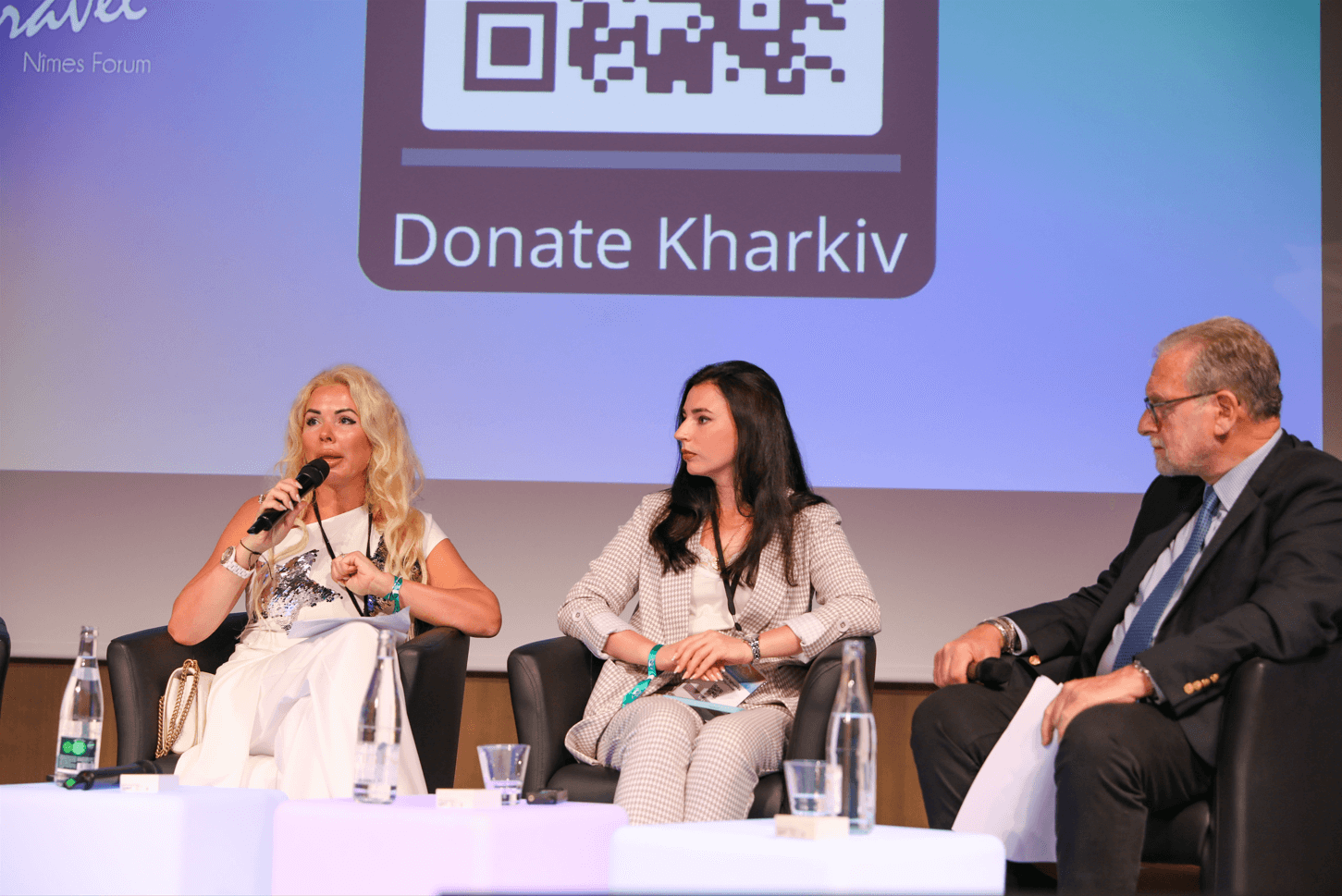
A World for Travel
As for Kharkiv, its representatives do believe in its bright future. They carry hope and walk bravely into every new day. Their inspiration, as they say, are Kharkiv’s 30 sister cities all over Europe and the world, some of which have joined the list recently, like Turku in Finland. The financial and humanitarian support from these and many other places make the difference.
And what made the difference for us was meeting these lovely ladies, thinking about resilience and war with them, and witnessing some genuine, warm human moments. The single most memorable one had to be a young Russian stepping up to the Ukrainian ladies to express their full support and heartbreak over the situation. As they pointed out, war has already ruined many lives on both sides of the border, and the longer it goes on, the more it takes away from the everyday human. No one wants war; no one deserves it. We stand with all its victims, equally inspired by Kharkiv’s panel and the words shared between its guests.
If you would like to help, we will share a few links where you can do that. Keep in mind that there are many ways to do so, but do stay wary of scams. If you are looking for other ways, we recommend checking out the lists of verified sources like CNBC or Forbes.
Help Kharkiv:
https://www.kharkivfoundation.org/home
Help Ukraine:
https://donate.redcrossredcrescent.org/ua/donate/~my-donation?_cv=1
https://www.globalgiving.org/projects/ukraine-crisis-relief-fund/
https://vostok-sos.org/en/ukraine-under-fire-support-vostok-sos-aid-operation/
For more, make sure to check out our dedicated Travel section.
AWFT22 Reflections for Croatia: Sustainable Tourism Development in BiH
November 7, 2022 – Although this year’s A World for Travel forum was dominated by stories from the host France, the USA, the UK, Spain, and other European countries, a few keynote speakers showed up to represent the underdogs. Jamaica’s minister of tourism, Bartlett, had stories to tell and could have kept going for days. Just ask Rajan Datar of BBC, who moderated the panels and was tasked with signaling “wrap it up.” A few interesting stories came from Croatia’s neighbours, Bosnia and Herzegovina. As we wrote, contracts were signed between the Global Travel and Tourism Resilience Council, Intrepid Travel, The Travel Corporation, and USAID’s Developing Sustainable Tourism in Bosnia and Herzegovina (Turizam) to facilitate the development of sustainable tourism in BiH.
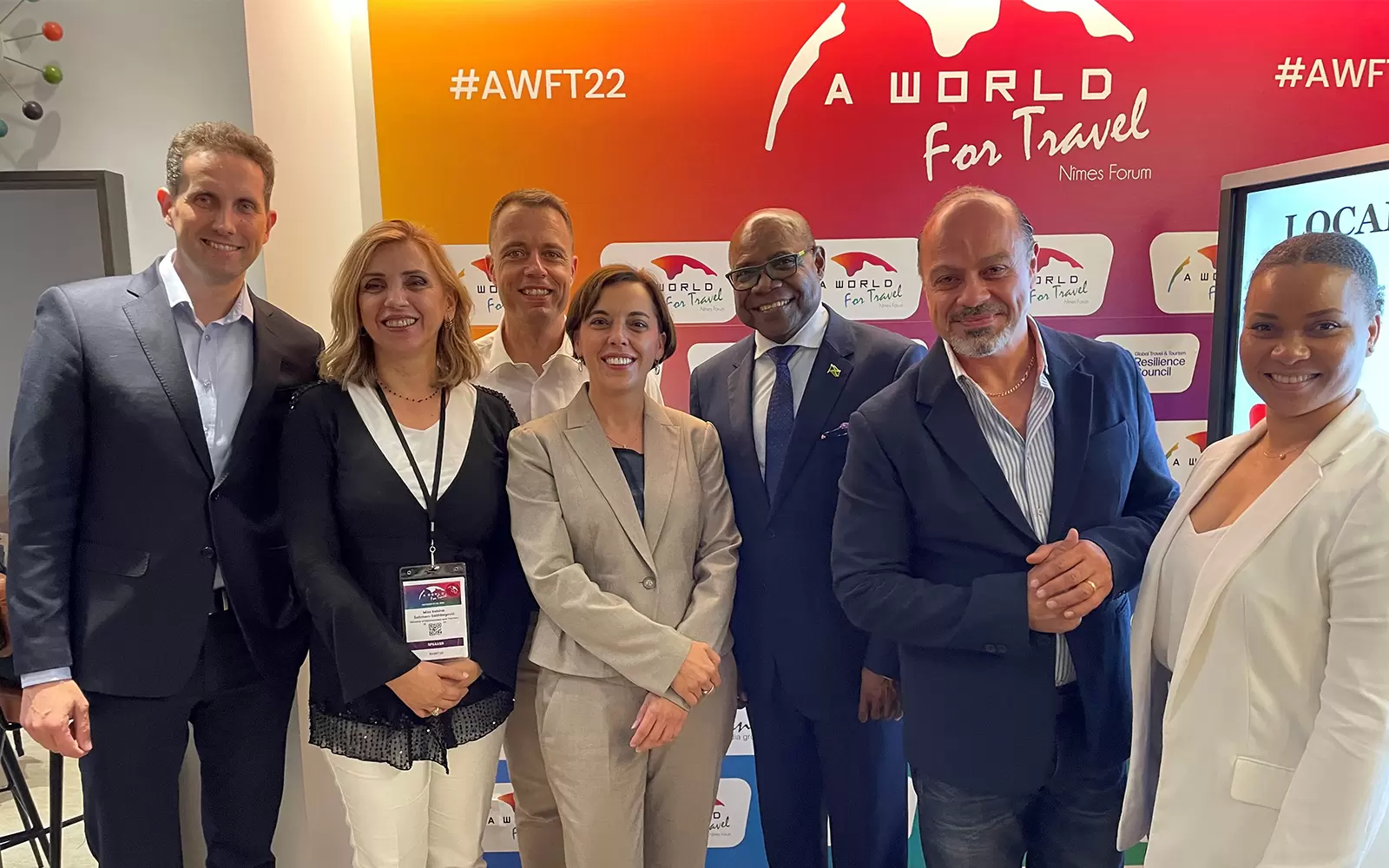
This made us think – is Croatia late for this train? Of course, the way and why tourism developed in Croatia is vastly different from BiH’s situation. With the Adriatic Sea there, it was almost inevitable that tourism would eventually bloom in Croatia. Whatever the supporting factors were (social media, the EU, marketing), the fact is that it happened somewhat rapidly and before the infrastructure was ready to support mass tourism. Dubrovnik is the perfect example.
What struck us the most in the panels with BiH is how much they emphasized the environment, underlining that their mission includes avoiding and mitigating mass tourism at all costs. With the help of their foreign partners, BiHis doing the opposite of what happened to Croatia – making tourism work for them, slowly, thoughtfully, and with a long-term plan. They did, of course, learn from Croatia, as there were many examples of what was done right, too. But it might not be a bad idea for Croatia to peek over the border and copy a few ideas on how to keep doing it sustainably.
An important point for BiH was the engagement and involvement of local communities in tourism. Whether that is local wineries, farms, or accommodation units. With an increase in OPGs and domaćinstva that now take part in Croatia, it was interesting to discuss the importance of developing this part of the tourist infrastructure. TCN spoke to BiH’s delegation at AWFT – Sabina Sahman Salihbegovic and Inja Hadzialic Bubalo of the Federal Ministry of the Environment and Tourism.
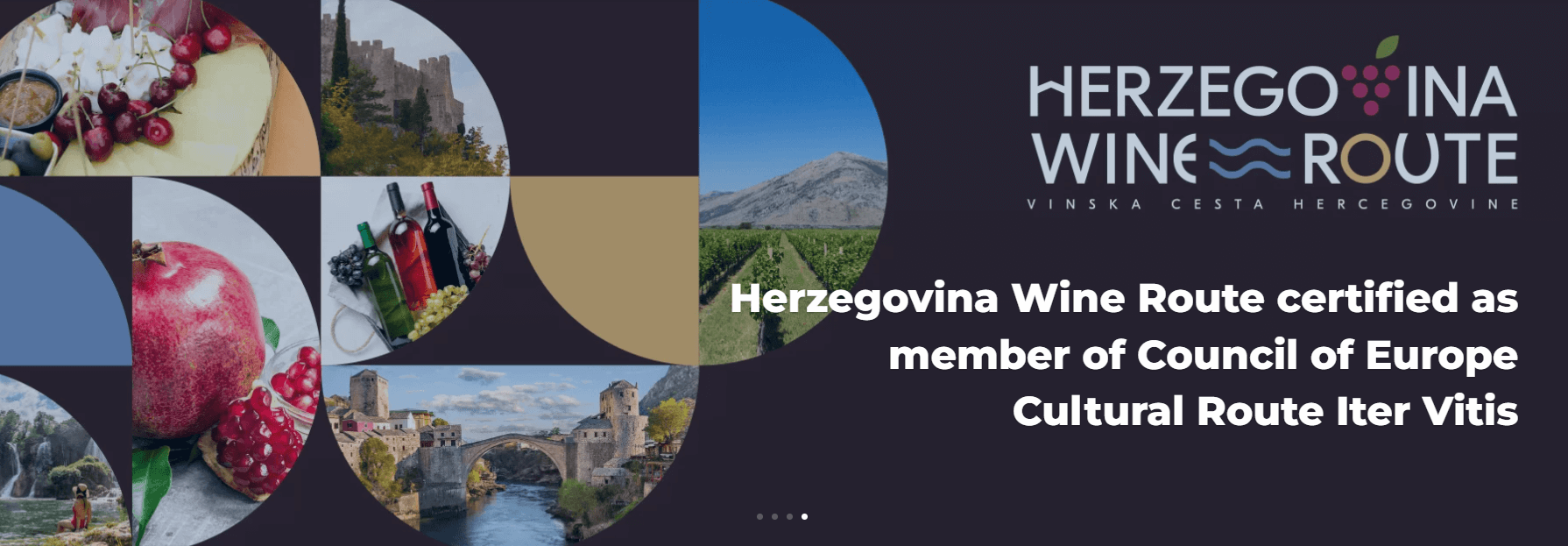
How do you view Croatia and the way tourism has developed there?
“We see Croatia as a good example of tourism development; it is a well-branded destination and a famous one. Many tourists from our country go to Croatia, they love staying there and visiting the beautiful places you have.
Would you say that tourism has been developing sustainably in Croatia?
Tourism in Croatia has been developing sustainably, but there is always room to improve.
Have you seen good examples of community involvement/engagement in Croatia?
We find an example of good local community engagement at the Plitvice Lakes, a good community bond, tourist offer, and public sector.
What do Croatia and BiH have in common to benefit the sustainable future of tourism?
Croatia and BiH have much in common; we speak the same language, we have similar traditions, historical bonds, beautiful monuments, nature, an attractive offer, and friendly people...
What are the main differences between the two countries?
The differences between us are mostly connected to the state government and the levels of power, but that is not something that should put tourism in a bad position...after all, tourism does not know borders...
We are stronger if we stand together – what are Croatia and BiH doing to use their geographical and cultural proximity to facilitate positive trends?
We can do much together by attracting tourists from around the world to both countries. Tour operators and travel agencies from our countries have already created connected itineraries so that for a few days tourists stay in Croatia and a few in BiH, and we can work more on our joint marketing and promotion, especially in long-distance markets.
While we might be competitors locally, competing on the global market together would make a lot of sense. Long-distance tourists are always looking to get the most out of their visit and want to travel as much as possible to the new part of the world. Croatia and BiH, but our other neighbours as well, could complement each other and create a fantastic offer.
What can foreign media do to support community involvement/engagement?
Foreign media can report about the beauties of our countries, of their unrevealed nature, parks, and protected areas.
How can we enhance community involvement/engagement in the diaspora?
Diaspora is valuable to every aspect of the economy, so it is for BiH and tourism. We can encourage people living outside their country to speak more about their home country to invite their friends and relatives to come and visit.
How do you view digital nomads, what is their role?
Digital nomads are coming; it is like a new way of life, a new way of doing tourism... We welcome them to BiH.
Are there cross-border tourism initiatives? What do you think about turning the region into a digital nomad hub?
Some projects are developing around cross-border digital nomad projects but still need real initiative. Of course, there is a legal matter concerning their period of stay in a particular country. We welcome all ideas aimed at developing tourism, so this one about a digital nomads hub is a good one and definitely something we could discuss in the future.
For more, make sure to check out our dedicated Travel section.
AWFT22 Reflections for Croatia: City of Nimes, Sustainable for 2000 Years
November 1, 2022 - The second edition of the first world forum dedicated to the transformation of the tourism industry, A World For Travel, was held in Nimes, France, from 27 to 28 October. TCN was there to learn about sustainability in travel and tourism. From a journalist's perspective, there was plenty of talk that seemed unactionable or unaccessible to the everyday person. Still, the forum did achieve its primary goal and made us think about the threats that the industry is facing and the fact that there is an urgent need for a change of direction. As for Croatia, there were no representatives, but the hope is that next year's forum will bring a lot more for this tourist destination where the question of sustainability remains very important.
In TCN, we had a chance to sit with the organisers, the representatives of Bosnia and Herzegovina, Ukraine, large and small businesses that focus on sustainable travel, and other media professionals who have worked on covering this vital topic. Our interviews and reflections are coming in the following days, all with the underlying thought of how Croatia is doing and where we are headed. Before we get to that, let us share what we learned from the city of Nimes.
Nimes was chosen for several reasons: its privileged location on the Rhone Valley-Italy-Spain axis with three direct motorway exits, 2 TGV stations with connections to Paris and Roissy airport, and to the main cities and their airports, not forgetting access to the TER network.
This ancient city is where history has left its mark for 2,000 years, as evidenced by the three main monuments: the amphitheatre, the Maison Carrée, and the Tour Magne, buildings that are today among the best preserved in the world. The vast restoration project of the Nimes amphitheatre, undoubtedly the largest undertaken in France at the beginning of the 21st century, demonstrates the common will to fully assume the heritage that is the pride of the City of Nimes, to preserve it and to transmit it. This restoration concerns the entire monument and is the most important one it has undergone since its origin. It is being carried out without interrupting the public's use of the site and its use for the many shows it hosts, as it has retained its primary function as a performance venue. This project follows the equally exceptional restoration of the Maison Carrée, which took place from 2006 to 2010. This monument represents one of the oldest and best-preserved expressions of a Roman temple dedicated to imperial worship. Its remarkable architectural quality also bears witness to the values of lasting peace, harmony and prosperity that the Roman Empire promoted and sought to guarantee in the first century AD.
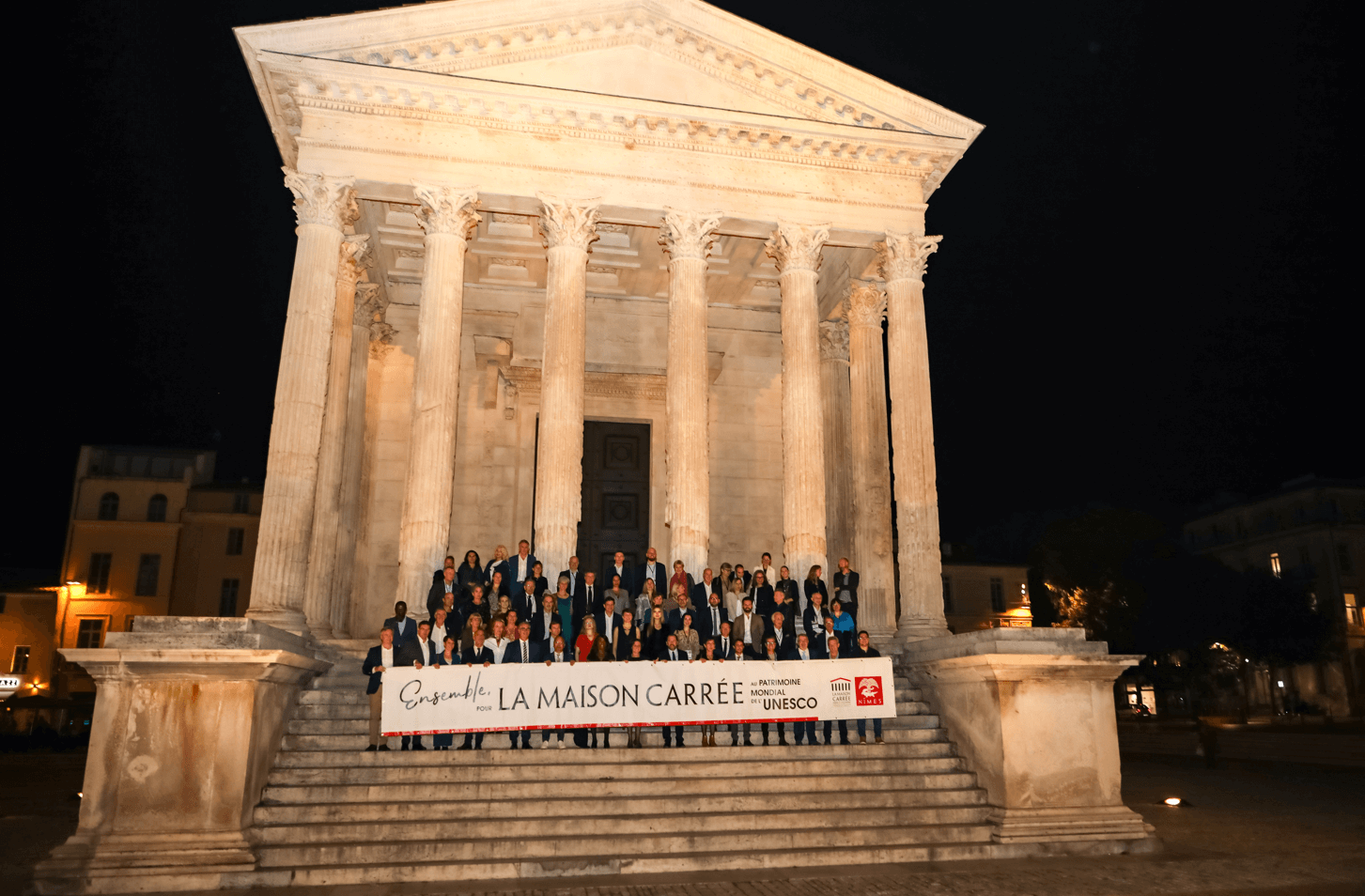
These restoration projects are all the more exceptional because the stones used are still extracted today from the same quarries used by the Romans 2,000 years ago. Did you say sustainable? The unique character of the ancient temple has motivated the city to apply for World Heritage status, an application that will be studied at the next UNESCO session. The protection of its ancient heritage, but also its enhancement, has been the backbone of the numerous urban redevelopment projects that have taken place over the last few decades.
In a constant concern to embellish and improve the living environment of the inhabitants and to make the city accessible to as many people as possible, many improvements have been made to facilitate the use of the city on foot and the organisation of events in the historic centre, not forgetting the connection with the transport network. The principle of intermodality prevails in the urban regeneration programmes and is reflected in the creation of high service level bus lines connected to park-and-ride facilities at the city entrances. A bicycle plan completes the package and is being developed in connection with the cycle paths and European routes that cross the territory.
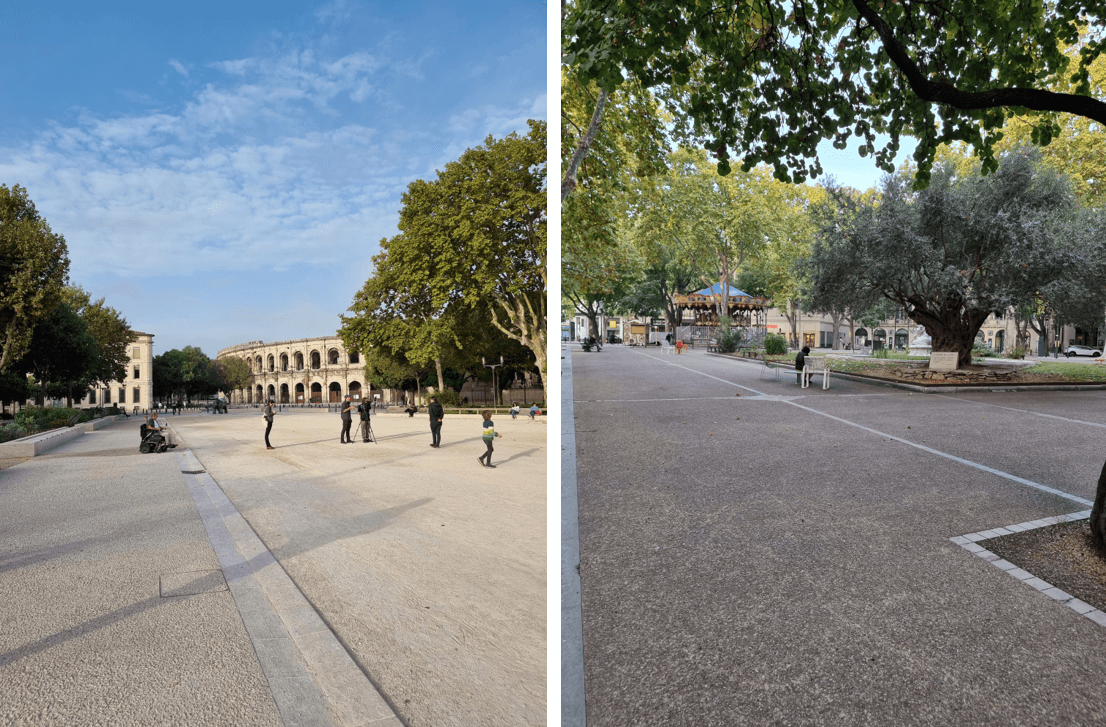
Improving the living environment and protecting the inhabitants from the vagaries of nature are priorities for the City, which has developed particularly innovative monitoring and warning tools, of which it was a pioneer. For more than thirty years, the City has been developing a substantial system to protect itself from climatic hazards and to preserve human lives as well as everything that contributes to economic development, including infrastructure. Residents, businesses, local media... all share the culture of risk and the imperative need to respect the measures provided for in the event of a crisis, in the interest of all.
Among the tools at its disposal, Nîmes has adopted a local town planning plan. While it restricts certain constructions and limits urban sprawl, it also guarantees the optimisation of buildable areas by rebuilding the city on itself. The development of numerous gardens and natural spaces, which are essential to avoid rainwater runoff, offer year-round peaceful and recreational spaces to a population that appreciates the conviviality of a human-sized territory. Designed for its inhabitants, these facilities are just as beneficial to the many visitors that Nîmes welcomes throughout the year to discover its heritage or to take part in a cultural or sporting event, or even one of the unmissable events that take place in the Roman city, such as the Emperor's Games, which take its visitors back to antiquity.
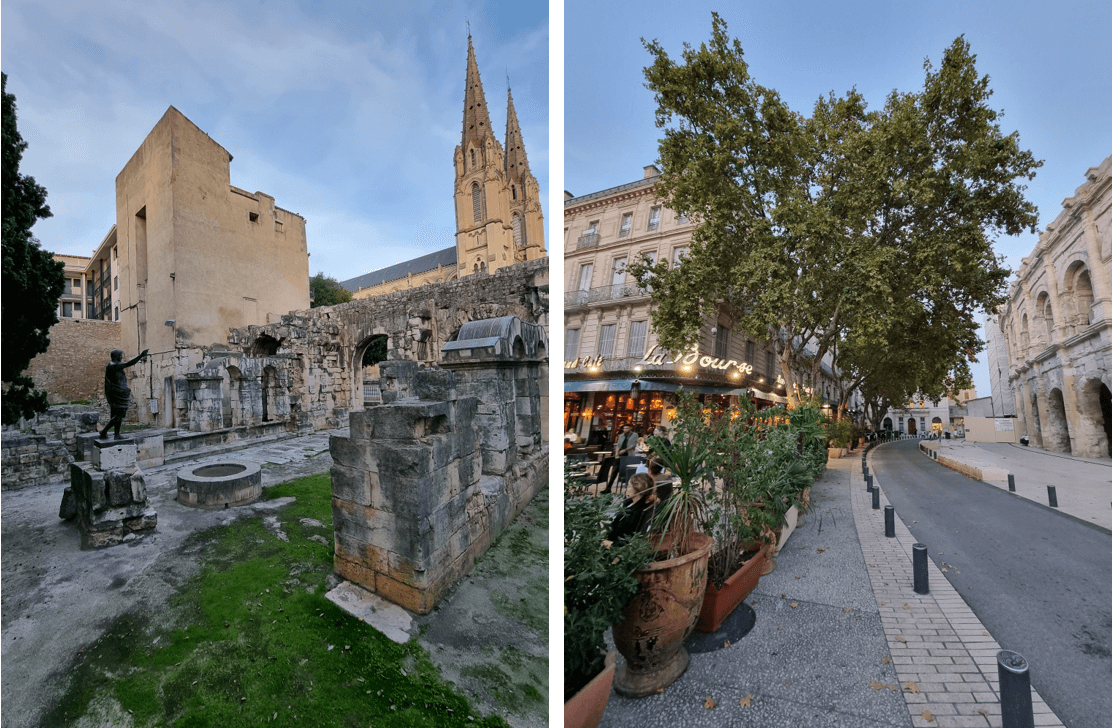
Nimes offers a calendar of events throughout the year in order to provide 4-season tourism and thus spread visitor numbers over the year. Ranked as the 8th greenest city in France according to the Green Cities Observatory and oxygenated by 372 ha of public spaces and 1,080 ha of natural spaces, it has been awarded 4 flowers in the Villes et Villages fleuris (Cities and Villages in Bloom) label and practices ecological management of its green and natural spaces, which is totally in line with the principles of sustainable development.
The city is committed to a sustainable approach with the implementation of global energy performance contracts, particularly in its museums, reducing its expenditure by more than 20% by 2021. It is also stepping up the development of its photovoltaic park and is continuing its work to obtain certification (Eco Réseau label, Sustainable Buildings Occitanie, etc.) to reduce energy consumption. The plan is to reduce the energy consumption of all its buildings of more than 1,000 m² by 40% by 2030 to comply with the requirements of the RTRénovation and RE2020 regulations.
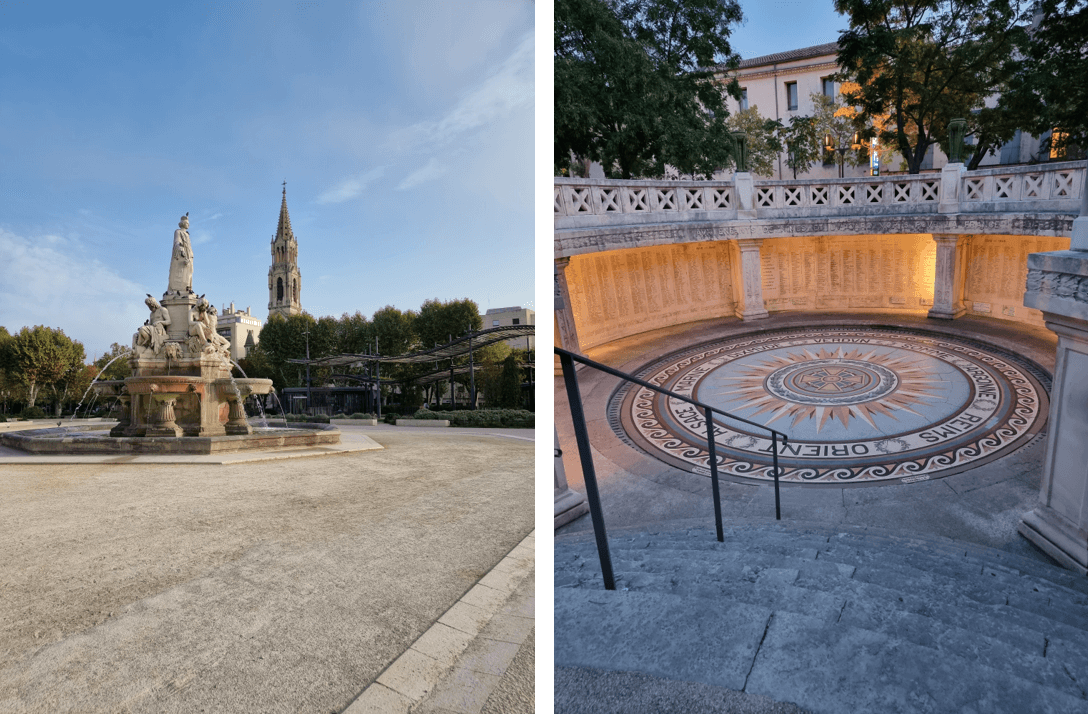
Nimes Tourism, in its capacity as a Destination Management Organisation, is accompanying the destination's professionals in a classification and labeling process, in collaboration with the CRTL Occitanie, which has placed this theme in its strategy. Already holding several labels, it is also committed to the ISO 20121 approach to strengthen its actions in terms of sustainable tourism.
In conclusion, while the participation of Nimes in the A World for Travel forum was definitely an excellent marketing move by the town's officials, it wasn't empty promises. The city of Nimes is a truly fascinating little place, where you can feel the effort that has been put into making it a sustainable destination. Lots for Croatia to learn, definitely. And Nimes is not the only place that can teach us something. Next up in our AWFT series: what our neighbours have been up to.
For more, make sure to check out our dedicated Travel section.
AWFT: BiH Signs Agreements - Cross Sector Collaboration for Sustainability
October 27, 2022, Nimes, France - The A World for Travel Forum was opened this morning with welcomes from the representatives of the partner organisations, the Occitanie region, agencies, as well as Jamaica's Minister of Tourism. The event of the morning was the signing of agreements between the Ministry of Environment and Tourism (notice how environment takes the first place) of Bosnia and Herzegovina and their partners, all on a mission to develop tourism in Bosnia and Herzegovina while focusing on sustainability. Tourism will not be an accident but a planned collaborative effort, with environment in the focus, built on the foundations of communication and partnerships between the governmental organisations and external partners. Panels of the country's representatives and interviews will follow this afternoon, but their opening did make us wonder if Croatia can still learn.
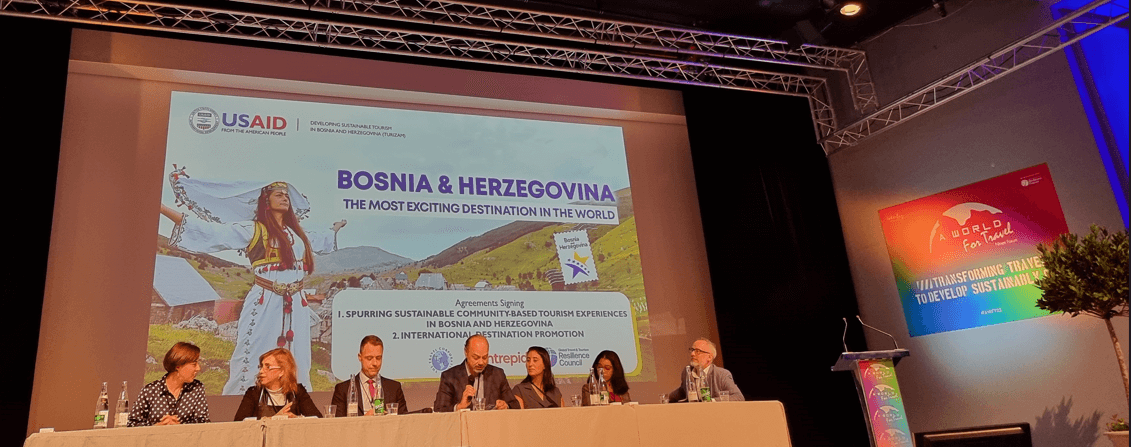
The representatives from the Global Travel and Tourism Resilience Council, Intrepid Travel, The Travel Corporation and USAID’s Developing Sustainable Tourism in Bosnia and Herzegovina (Turizam) project are signing the culmination and launch of their partnership which was born to facilitate the sustainable tourism development of Bosnia Herzegovina. The project is built on a platform of collaboration starting with the spurring of sustainable community-based tourism experiences to drive and answer increased market demand for unique experiences. The international networks of these partners will jointly work on transforming Bosnia and Herzegovina’s world-class tourism potential into a globally recognized example of sustainable tourism development. Two agreements are being signed by USAID Turizam Chief of Party Ibrahim Osta, Intrepid EMEA Managing Director Zina Bencheikh, The Travel Corporation Global Sustainability Manager Nadine Pinto and the CEO of Jacobs Media Group/The Global Travel and Tourism Resilience Council, Duncan Horton.
“We could not be prouder of the work our Resilience Council has done this year, particularly with such a positive story coming forward to share with other destinations who may be looking at repositioning sustainably,” stated Mr. Horton in a recent interview with Travel Weekly.
“Developing sustainable tourism in new destinations is a key focus for us at Intrepid and we are delighted to be working with USAID, Project Turizam and the Global Travel and Tourism Resilience Council on this project. Partnerships like these are essential as we move toward a more sustainable future for our industry,” said Zina Bencheikh, Managing Director, INTREPID Travel, EMEA. She continued,” We’re grateful to play a part in making this beautiful destination more accessible in a way that respects the history of the country, leaves a light footprint and respects and supports local communities."
The partnerships are building upon a strong foundation which includes community engagement, toolkits and consistent communication on the value of collaboration in driving sustainability. The destination benefiting from these projects, Bosnia and Herzegovina has joined the AWFT22, as they did last year in Evora to share more in depth various aspects of the project with this year’s attendees. The announcement at AWFT 22 includes the participation of Deputy Minister of Tourism and Environment of the Federation of Bosnia and Herzegovina Sabina Sahman-Salihbegovic, Secretary General of the Republika Srpska Chamber of Commerce Dragana Kokot, Deputy Director of the USAID/BiH Economic Growth Office Dr. Erol Mujanovic and USAID Turizam Chief of Party Ibrahim Osta.
Additionally, USAID Turizam Tourism Product Development Team Leader Fedja Begovic will participate in the Case Study Agriculture and the Food Industry’s Relationship with Travel, Sabina Sahman-Salihbegovic is one of the speakers at the panel Community Involvement vs. Engagement – Has it Been defined? Are the Benefits Reaching Local Communities?, Dragana Kokot will be part of the panel How to Bring Talent Permanently to the Industry?. Ibrahim Osta will lead one of the headliner sessions titled Billions Available, a session with panelists such as BpiFrance, Certares, ICF and Roland Berger which represent investment, finance and consulting global powerhouses with billions of euros in annual investments in the tourism, hospitality, aviation and infrastructure spheres. The objective of this session is to explore the most optimal approach to expand access to capital for large-scale multi-billion dollar investments and to identify challenges and solutions to smaller borrowing needs of tourism enterprises. In addition to his participation in the opening session dealing with international partnerships, Erol Mujanović will participate in the conference’s Final Roundtable slated to determine the event’s output.
"Tourism is the country's strategic sector, accounting for around 11% of total employment and one of the key generators of exports and foreign exchange. And perhaps the best embodiment of the concept of partnership is how our USAID Developing Sustainable Tourism in Bosnia and Herzegovina project is being implemented. Our delegation here in Nimes consists of the Ministry of Environment and Tourism representing government, the Chamber of Commerce representing the local private sector, two international trade partners, examples of our global partnerships, and our project leadership that works with local communities, entrepreneurs, and youth," noted Erol Mujanović, USAID/BiH Economic Growth Office Deputy Director.
USAID Turizam is a five-year project that aims to fuel broad-based tourism-driven economic growth and promote social harmony by capitalizing on Bosnia and Herzegovina’s rich cultural heritage and distinctive nature. The project aims to set the tourism industry on a robust growth trajectory toward a sustainable tourism economy with increased employment and business expansion. With the aim of generating arrivals, increasing tourism spending by international travelers in Bosnia and Herzegovina, expanding retail options for the country’s rural producers and spreading economic opportunities into secondary destinations, USAID Turizam is establishing partnerships with the following companies and organizations:
- Global Travel & Tourism Resilience Council’s key focus is to bring together the public and private sectors to facilitate collaboration and sustainability in the development of tourism strategies. Similarly, broad dissemination of collaborative efforts towards sustainability through tourism dispersion, cultural product development, experiential opportunities, local community inclusion, regional coalitions and financial parity sets a path for others to follow.
- The Travel Corporation (TTC) is a leading operator of 40 award-winning, sustainable brands, offering unique and industry-leading service that puts its guests at the heart of everything the brand does. TTC also has an extensive global distribution & marketing network to support the inward flow of business to support activities included in TTC tours.
- Intrepid Travel is a leading operator of Sustainable Experience Rich travel with significant expertise in developing experiential activities in communities and supporting various stakeholders to prepare to manage, operate and maintain their business as a supplier. Intrepid also has an extensive global distribution & marketing network to support the inward flow of business and support activities included in Intrepid tours.
For more, make sure to check out our dedicated Travel section.
AWFT: A World For Travel Global Travel and Tourism Forum in Nimes, France
October 26, 2022 - The renowned A World for Travel (AWFT) event will take place in Nimes, France, on October 27-28, 2022, celebrating its 2nd year.
As stated in the official press release, the Forum announces the Egyptian government providing a preview of COP27. Ukrainian officials will share how destinations cope with war and protect their tourism assets, while Google will deliver new traveller trends. Ministers of Tourism will participate in discussions sharing groundbreaking initiatives. The two-day event, designed in a Davos-style manner, is aimed at transforming the travel industry and all those serving the traveller to become sustainable in all aspects of their businesses: environmentally, socially, economically, and climatically. Produced in conjunction with the Global Travel and Tourism Resilience Council, the A World for Travel organisers are working globally to ensure the travel industry and all associated businesses operate sustainably.
Thought leaders from global enterprises such as Mastercard, Costa Cruises, Pierre et Vacances, ICF, Amadeus, World Bank, Delta Airlines, Europcar, TUI, American Express GBT, SNCF, Alstom and Accor will join public sector officials, including Ministers from France, the EU, Scotland, Jamaica, Bosnia, and Herzegovina, Moldova and Portugal to determine “how” to make travel more sustainable.
The event moves into its second year partnering with the 3,000-year-old city of Nimes in the South of France, where the city is “set to become one of Europe’s outstanding examples of sustainability,” announced Jean-Paul Fournier, the Mayor of Nimes. The city’s efforts are supported by the regional government of Occitanie. “With the support of the local community, the event will deliver clear guidance on the development and management of sustainable destinations, how to address the human aspect and impact on a destination, its economics, and adaptation to climate change,” shared Christian Delom, Secretary General, AWFT.
About the Global Travel and Tourism Resilience Council
In 2016, the Global Travel and Tourism Resilience Council was launched. The Council is a global platform to bring together the public and private sectors, addressing crisis management, preparedness, recovery, and resilience. As an international thought leadership forum, the Council facilitates dialogue and works with best-of-breed companies to benefit destinations and the global travel industry. More information at resiliencecouncil.com.
About A World for Travel
A World for Travel (AWFT) is aimed at transforming travel to preserve, globally and locally, at the same time and for the same purpose for humanity and the planet. A World for Travel allows all tourism stakeholders to react, take initiatives, reshape the tourism product to meet climate, digital & social requirements, develop a positive image brought by tourism, fix the ongoing milestones to make it happen, create a common platform to share best practices and perspectives by involving all stakeholders with mixed interests and identifying threats to travel development.
Follow along for coverage, interviews, insights into how Croatia has been performing, and more with TCN.
For more, make sure to check out our dedicated Travel section.


